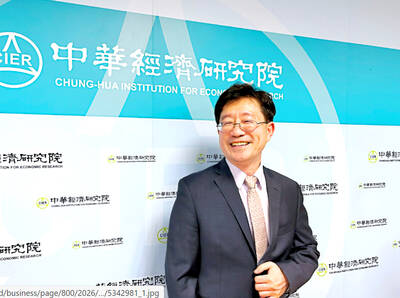Taiwan should change its military thinking and figure out how to make sure it has the ability to safeguard continued peace and stability both across the Taiwan Strait and within the Indo-Pacific region, a US official said on Tuesday.
David Helvey, the principal deputy assistant secretary of defense for Asian and Pacific Security Affairs, made the remarks at the US-Taiwan Defense Industry Conference in Annapolis, Maryland.
According to a transcript of the speech provided by the Ministry of National Defense, Helvey said that in strengthening its armed forces, Taiwan is developing sufficient conventional capabilities to meet the peacetime needs of a military in a rough neighborhood.
However, he warned that Taiwan could not “afford to overlook preparing for the one fight it cannot afford to lose.”
In the face of China’s growing military threat, Taiwan should respond by improving its national defense, which means innovation, smart investments and leveraging asymmetries to its advantage, he said.
To achieve that, the features should be incorporated into Taiwan’s need for a credible, resilient and cost-effective deterrent, Helvey said.
To be credible, Taiwan’s “acquisitions, training and doctrine” need to “address the vulnerabilities of a potential adversary that spends more and fields faster,” he added.
Resilience means that Taiwan’s forces and systems are maneuverable and can operate autonomously while facing cyber, electronic, missile and air attacks, Helvey said.
Being cost-effective means retaining conventional capabilities, but focusing on “research, development, procurement, and maintenance on affordable and scalable asymmetric capabilities that are integrated into a multidomain defense,” Helvey added.
“If Taiwan’s military makes these changes to its force structure, it is equally important that Taiwan continue to make progress on how it trains and organizes its forces,” he said.
“The [US] Department of Defense has been helping Taiwan to think through how to increase joint capabilities while operating in a decentralized environment,” which would enable Taiwan to deploy mobile systems without central command and control, Helvey said.
Given the capabilities the Chinese People’s Liberation Army (PLA) could bring to bear in a blockade or outright amphibious invasion, including information control, Taiwan’s progress is key, he added.
Achieving that goal would require developing and empowering junior officers and non-commissioned officers (NCOs), Helvey said, adding: “Leaders at senior levels must trust that their junior leaders — officers and NCOs — are capable of performing their mission.”
The changes in thinking, procurement, planning and training are needed because of the magnitude of China’s threat, he said.
“Taiwan cannot count on Beijing’s forbearance for its security,” Helvey said, adding that there is no indication that China is preparing to renounce the use of force to bring Taiwan into its fold, now or in the future.
The US Department of Defense’s National Defense Strategy has highlighted this concern, as China leverages military modernization, influences operations and predatory economics to coerce neighboring countries to reorder the Indo-Pacific region to its advantage, he said.

The Grand Hotel Taipei on Saturday confirmed that its information system had been illegally accessed and expressed its deepest apologies for the concern it has caused its customers, adding that the issue is being investigated by the Ministry of Justice Investigation Bureau. The hotel said that on Tuesday last week, it had discovered an external illegal intrusion into its information system. An initial digital forensic investigation confirmed that parts of the system had been accessed, it said, adding that the possibility that some customer data were stolen and leaked could not be ruled out. The actual scope and content of the affected data

DO THEY BITE IT? Cats have better memories than people might think, but their motivation is based entirely around the chance of getting fed Cats can remember the identity of the people who fed them the day before, Taipei-based veterinarians said on Friday, debunking a popular myth that cats have a short memory. If a stray does not recognize the person who fed them the previous day, it is likely because they are not carrying food and the cat has no reason to recognize them, said Wu Chou Animal Hospital head Chen Chen-huan (陳震寰). “When cats come to a human bearing food, it is coming for the food, not the person,” he said. “The food is the key.” Since the cat’s attention is on the food, it

Taiwan must act to preempt potential Section 301 investigations as US President Donald Trump moves to a new tariff strategy, following a US Supreme Court ruling that voided tariff measures, an academic said yesterday. Countries running the largest trade surpluses with the US face a growing likelihood of Section 301 investigations, Chung-Hua Institution for Economic Research president Lien Hsien-ming (連賢明) said. Section 301 refers to a provision of the Trade Act of 1974 that allows Washington to impose retaliatory tariffs over perceived unfair trade practices, including the running of large trade surpluses. Because Taiwan has become the fourth-largest source of the US’ trade

People hold incense and pray with offerings in front of Taipei’s Kuanghwa Market yesterday. The fifth day of the Lunar New Year is traditionally about welcoming the God of Wealth, during which companies and shops set off firecrackers to celebrate their reopening and pray for good business in the new year.